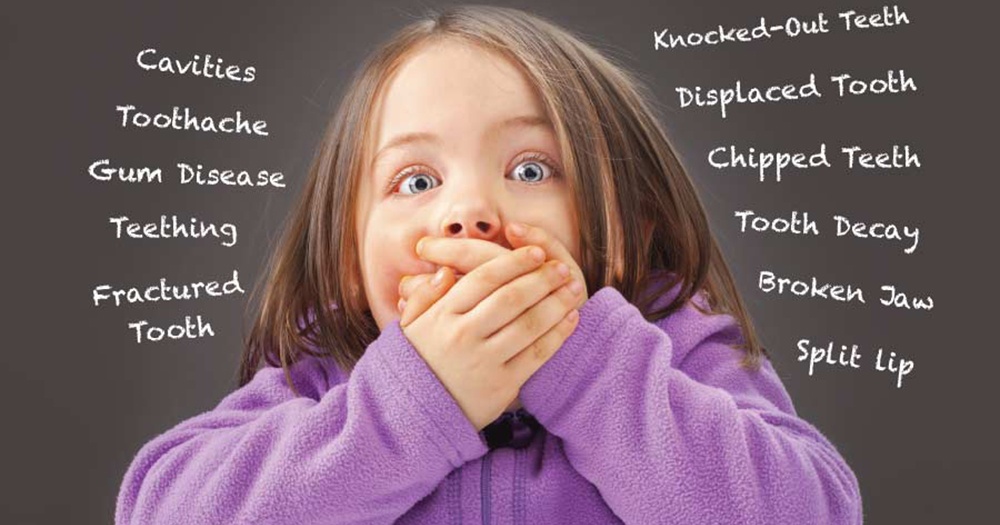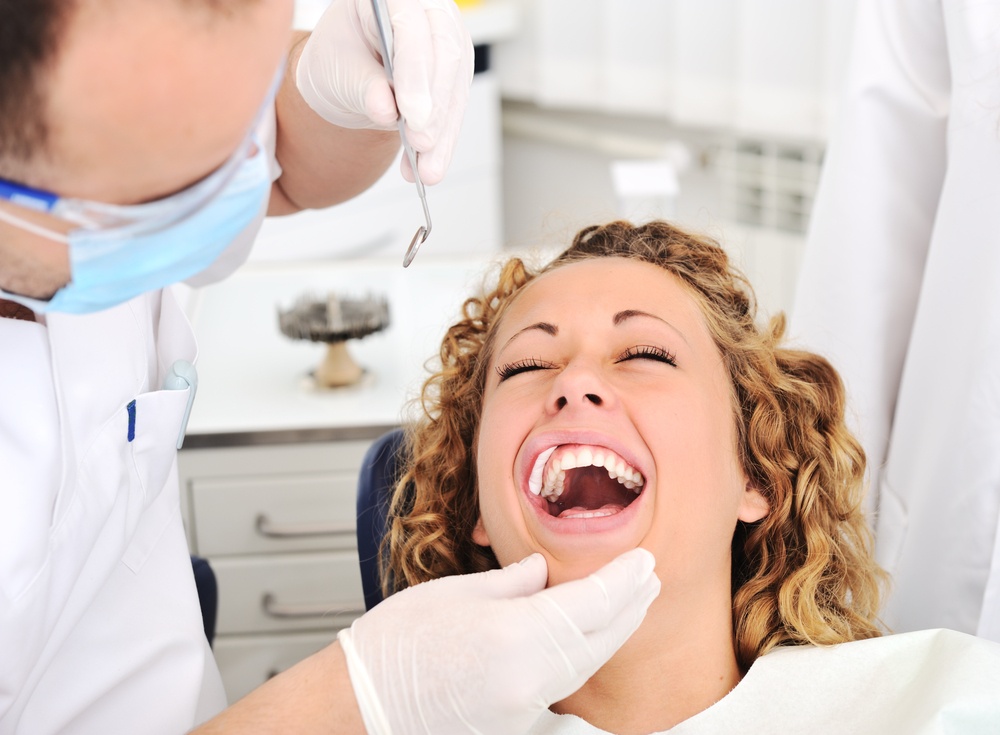
Dentophobia — a strong fear of going to the dentist — is very common. Many more people deal with lower level anxiety in the days and hours leading up to a dental visit, even if they wouldn’t classify it as fear.
WebMD describes the difference between anxiety and true dental phobia this way: “Dental phobia is a more serious condition than anxiety. It leaves people panic-stricken and terrified. People with dental phobia have an awareness that the fear is totally irrational, but are unable to do much about it. They exhibit classic avoidance behavior; that is, they will do everything possible to avoid going to the dentist. People with dental phobia usually go to the dentist only when forced to do so by extreme pain.”
While fear and anxiety are normal human emotions that can impact our lives in various ways, this is a particularly dangerous one because it causes “13% to 24% of people around the world” to delay or completely avoid the dental care they really need, putting both their oral health and their overall health at serious risk.
What causes these feelings? And, what practical tips can you follow to overcome this fear?

What causes fear of the dentist?
Dentophobia and anxiety about going to the dentist can both be caused by many different things. Some of the most common causes that sufferers report include:
- Fear of needles or injections: None of us love getting shots, but some people struggle with full-blown trypanophobia, an extreme fear of needles or injections. While every dentist visit certainly doesn’t involve a needle, the two can become inextricably linked in the patient’s mind, leading to a crippling fear of the dentist as well.
- Fear of pain or discomfort: A more general fear of experiencing pain or discomfort is also strongly linked with fear of dental visits. Although dentists and hygienists have many tools and methods at their disposal to help reduce these issues, there’s really no way to completely remove the possibility of something causing a patient minor pain, even during a routine cleaning. In most cases, just the anticipation of possible pain is enough to induce serious anxiety or fear.
- Fear of anesthesia or sedation: Ironically, two of the tools dentists can use to help reduce or eliminate the previous fear (of pain or discomfort) can induce fear as well. Some patients get anxious about the physical effects of being sedated and/or the loss of control sedation or anesthesia can produce. Since they don’t want to feel pain, AND they don’t want to be sedated, this combination of anxieties can lead to avoiding dental visits altogether.
- Loss of control: Closely related to fear of anesthesia is a more general anxiety that comes with the patient knowing that sitting in the dentist’s chair means being placed in a position of limited or no control. Even without anesthesia, it must be admitted that being manipulated in a motorized chair, then having tools and fingers placed in your mouth for 20 minutes or more requires a level of surrender.
- Embarrassment about bad teeth: In some cases, a poor history of caring for one’s oral health or needed dental work that’s been neglected can result in embarrassing conditions like extremely bad breath, badly decayed or discolored teeth, or diseased gums. People who are highly self-conscious may be too embarrassed by the appearance of their mouth to allow a dentist to see it.
- A bad previous experience: A negative dental experience in the past is often at the root of dentophobia or anxiety, especially for people who are not otherwise prone to high levels of anxiety or fear. It may be that their experience happened at a very young age and has grown out of proportion in their mind, or it may be relatively recent and still fresh enough to make another dental visit difficult to swallow.
- Knowledge of someone else’s bad experience: And, in some cases, fear and anxiety are rooted in the negative experiences of someone else, perhaps handed down through generations and/or heavily embellished through multiple retellings.
- Negative news items about dentists: Occasionally, a story will make the rounds on social media or news outlets regarding a particular dentist who did something terrible, or a dental procedure that went poorly for one or more patients. These may be accurate or they may not, but they can cement the attitudes of patients who already struggle with fear of the dentist, and can cause anxiety in patients that were otherwise comfortable with visiting the dentist.
- Anxiety about cost: This one is actually left off many lists regarding fear of the dentist, because it doesn’t involve actual fear or anxiety over having dental work done or how the work is accomplished. Instead, it revolves around the financial consequences, which can be quite steep, especially in urban areas. It’s regrettably common for patients who would otherwise have no issues going to the dentist to avoid doing so because they simply can’t afford it.
If the cost of dental care makes you anxious, consider a dental discount plan.
Is there really anything to fear?
Being perfectly transparent, it must be admitted that visiting the dentist is generally not a fun, relaxing experience. As is the case when you visit any other medical professional, there are some things your dental hygienist or dentist need to do or say that can be uncomfortable, embarrassing, or awkward. And, at times, there may even be some pain involved.
But, to have a full, well-rounded understanding of the situation, it’s important to note the following fact too:
Your dentist & hygienist want you to be as comfortable & relaxed as possible.
After all, the more relaxed you are when you come in, the easier it is for them to do their job. If you’re calm and relaxed, you’ll be able to open your mouth wide, stay still, and generally cooperate more with their efforts. This makes for a faster, more pleasant, and more effective visit all around.
And, the happier you are when you leave, the better the chance you’ll come back. Since returning patients are the lifeblood of any dental practice, it’s simply in the dentist’s best interests to do everything in his or her power to make sure patients leave the office showing off that beautiful smile.
That being said, most of the fears and anxieties listed above are very real, legitimate issues many patients face. If that includes you, even your dentist’s best efforts will likely fall short of relieving your fear unless you take action yourself to overcome it. The following tips have been collected from countless people just like you who have successfully overcome their own dentophobia so they could properly care for their oral health.

How to overcome fear of the dentist
As with most debilitating fear or anxiety, overcoming fear of the dentist requires a multi-pronged approach. In this case, three primary factors are involved:
- Preparation
- Coping mechanisms
- Solutions the dentist can provide
In severe cases, working with a professional therapist or psychologist may be the right choice. In those cases, the patient is likely dealing with more than one trigger for their fear or anxiety, so the tips being discussed here will likely be folded into a larger therapeutic effort. We’re going to move forward from the perspective of applying these tips on your own, but they are no less effective when assisted by a professional.
Preparing for your dental visit
Since anxiety tends to build on itself, the hours and days leading up to a scheduled dental visit are often critical in slowing the buildup and redirecting negative thoughts before they turn into actions (such as canceling your appointment.)
Here are some methods patients have successfully used to prepare for a fear-inducing visit:
- Find the right dentist for you: If you’re struggling with dental fear, take the time to choose a dentist and dental office that is willing and able to support and help you. While some people choose a dentist based solely on location, you’ll want to put more time and effort into contacting and even visiting various offices and speaking to the dentist and staff. Some offices actually specialize in treating patients that deal with fear and anxiety.
- Commit to your oral health: When you commit to caring for your oral health, you give yourself strong motivation to overcome your fear. Educate yourself on why your oral health is vital to your overall health. Sign up for dental insurance coverage or join a dental discount program, investing in the care you then need to obtain.
- Discuss your anxiety ahead of time: Once you choose a provider that’s equipped to help you and with whom you feel relatively comfortable, it’s still important to discuss your unique concerns with them in depth. No two patients’ anxieties are exactly the same, and your dentist can’t help you succeed without knowing exactly what you’re thinking and feeling ahead of time.
- Visit the office & sit in the chair before your visit: When psychologists treat phobias, a large part of the standard treatment is called systematic desensitization. This involves slowly exposing the patient to the object of their fear in a controlled environment. This is often done numerous times, each time increasing the length and/or intensity of the exposure. For many patients, just entering the room and sitting in the dentist chair without needing to worry about having a procedure done can be instrumental in reducing their anxiety.
- Explore meditation & relaxation techniques: We’ll discuss this more in the next section, but getting a headstart on learning and employing relaxation techniques can help in the days and hours leading up to a dental visit as well. Practice makes perfect.
Coping mechanisms to reduce your dental anxiety
Hopefully, all of your preparation has allowed you to get to the day of your dental appointment without losing sleep, getting sick, or canceling. The next hurdle is coping with your fear during the actual procedure. The following coping mechanisms have helped others in your position:
- Show up when it’s best for you: Some patients find that arriving for their appointment early gives them plenty of time to relax and prepare themselves mentally in the waiting room. It’s also another form of systematic desensitization, since all the sights, sounds, and smells we associate with the dentist are there in the waiting room too. On the other hand, some patients do better arriving right on time so they’re not forced to sit in the waiting room allowing their anxiety to build once again just before the procedure. You need to do what’s best for you in this circumstance. If you’d prefer not to wait inside, discuss this with the staff at your provider and try to get the very first appointment slot of the day. That way, there will be no unexpected delays at the last moment.
- Bring someone with you: Oftentimes, having a spouse, partner, or close friend with you can make all the difference in your ability to cope with the anxiety that goes with a dental visit. This person can help keep your mind occupied with conversation while you wait, reducing the self-affirming buildup of fear. And, if you make arrangements ahead of time, they can usually even accompany you during the procedure where their comforting presence can go a long way toward controlling your anxiety.
- Employ relaxation techniques: Simple deep breathing exercises and mindfulness meditation can work wonders for individuals whose anxiety can otherwise run away with them. And, the best part is that you can use them at any time before, during, and after your procedure. Physical objects like stress balls and worry stones work very well in conjunction with relaxation techniques. As long as these objects aren’t going to get in the dentist’s or hygienist’s way during a procedure, there should be no issue with using them in the chair.
- There’s an app for that: Dental Fear Central (DFC) is an app available for Apple and Android devices that are designed to help people cope with severe fear and anxiety surrounding dental visits. Read more about it and other oral health apps here.
Solutions your dentist can provide
While all of the following options won’t be available at every provider, most offices can offer one or more to help you cope with your fear:
- Sedation: Most offices can provide a wide arrange of types and strengths of sedation or anesthesia. From prescribing a single Xanax or Valium to take just before you arrive to general anesthesia that will ensure you don’t even remember being in the chair, these drugs can help patients relax, reduce pain and discomfort, or both. You should definitely discuss sedation with your dentist ahead of time because, as noted above, this can be a trigger for some fears. Also, your provider will need to determine to what extent you need to be awake and responsive during whatever procedure you’re having done. Together, you should be able to arrive at a sedation method that works best for you.
- Distractions: It’s tough to find a dentist’s office that isn’t already piping 80’s soft rock hits into every room. But, if that’s not your thing, many offices have also installed chair- or ceiling-mounted televisions with a number of viewing options. Others may provide headphones for your listening pleasure. Discuss the options with your provider and, if they’re okay with it, consider bringing your own listening or viewing options too.
- Communication: As we’ve already noted, an open line of communication can do wonders for relieving anxiety around dental visits. Hopefully, you’ve had many conversations with your dentist and the office staff before arriving for your visit. During the procedure, however, communication is even more important. And, since you’re likely going to be unable to talk freely, it’s important to arrange with the dentist or hygienist ahead of time. Ask them to walk you through each step of the procedure and provide warning any time a different or unpleasant sensation may occur. Agree on a hand signal you can use that stops everything until you’re comfortable to proceed.
Your provider may very well have additional tools available to help you cope with and overcome fear of the dentist.

Your fear of the dentist will get better with time
For most patients, even severe dentophobia can be controlled and even eliminated over time by employing the kinds of preparation and coping mechanisms described above. Seeking out professional help is always a good option if you find the task too overwhelming to handle on your own or if your best efforts have fallen short of where you want to be.
The most important thing to keep in mind is that receiving adequate dental care is a vital part of maintaining your overall health. Avoiding the dentist’s chair, regardless of the reason, is dangerous and not worth the risk. So, prepare well, employ the necessary coping mechanisms, work closely with your provider, and you can definitely overcome fear of the dentist.

